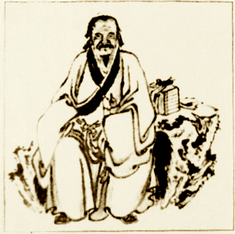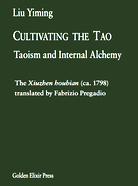Superior Virtue and Inferior Virtue
Liu Yiming (1734-1821), Cultivating the Tao, Chapter 19
Reproduced from:
Cultivating the Tao: Taoism and Internal Alchemy (Xiuzhen houbian)
Liu Yiming (1734-1821)
Translated by Fabrizio Pregadio
Golden Elixir Press, 2013
Paperback
Divided into 26 short chapters, this book provides a comprehensive overview of the main principles of Taoism and an introduction to Taoist Internal Alchemy, or Neidan, written by one of the most important masters of this tradition.
 This page is part of a series on Liu Yiming. See the complete index.
This page is part of a series on Liu Yiming. See the complete index.
Translation
An ancient scripture says:
Superior virtue has no doing: there is nothing whereby it does.
Another scripture says:
Superior virtue keeps one's form intact by means of the Tao.
Both passages say that superior virtue and inferior virtue differ in status, and that their operation is also not the same.
Translations from Cultivating the Tao
● True and False Body and Mind
● Precelestial and Postcelestial Yin and Yang
● The One Opening of the Mysterious Barrier
● Superior Virtue and Inferior Virtue
Translations from Liu Yiming's commentary to Awakening to Reality
Essentially, in superior virtue one's body is intact and one's virtue is full, and the Yang of Qian ☰ has never been damaged. "Never been damaged" means that the precelestial Yang has never been damaged; it does not mean that the postcelestial body has not lost its integrity.(3) When the Yang of Qian is plentiful, with a pure and flawless perfect Essence and an inchoate One Breath, the five agents gather together and the four images join in harmony. All of the precious things are intact.
Without a method for protecting and guarding this, the Yang necessarily culminates and generates the Yin; wholeness culminates and becomes lacking. Those who know this hasten to seek the oral instructions of an enlightened master. Without waiting for the birth of Yin, they use the method of "keeping one's form intact by means of the Tao." They set the natural True Fire in motion, and refine the Yin breath of the entire body; they use the Yin instead of being used by the Yin, and achieve efficacy in the postcelestial.(4) When the Yin is exhausted and the Yang is pure, they live a long life free from death.
Liu Yiming
As for inferior virtue, after the Yang culminates and the Yin is born, the precelestial is dispersed. The five agents are divided from one another, the four images are not in harmony, and all of the precious things are lost. If you cultivate this state by the way of "non-doing," it would be as if in the tripod there is no Seed; what is the purpose of using water and fire to boil an empty pot?(5) You must "steal Yin and Yang," "seize creation and transformation," and return from the postcelestial to the precelestial.(6) Only then can that old thing from times past be recovered: it had gone but now it returns, and comes again into your complete possession.
After you recover that original thing and the foundation of your Existence is firm, you should again set up the furnace and the tripod, and perform the way of non-doing. By "nourishing warmly" the Embryo of Sainthood (shengtai), in ten months the Breath (qi) becomes plentiful, and you deliver the dharma-body (fashen). Then this road has led to the same destination as superior virtue.
People in later times have not understood superior virtue and inferior virtue. They merely say that when the essence is given forth, that is inferior virtue, and when it is intact, that is superior virtue. This is a great error! The essence of the intercourse is something that comes into being after your birth: it is the impure within the impure. How could you take it as a criterion?(7)
Advance by removing one layer after the other: when you remove one layer, continue to the next one until you finally reach the inner core of the Dao. Then you will be able to see that all the dust of this world is a precious jewel.
As for the discourse about "losing integrity at the age of sixteen," this number refers to "the two eights making one pound": when the Yang culminates it generates the Yin, and after the Yin is generated, the essence is also generated.(8) Therefore this a discourse about Yin and Yang, and not about the number of years. If it were a discourse about the number of years, in the world there are some who emit their essence for the first time at the age of sixteen, some who emit it for the first time before the age of sixteen, and some who emit it for the first time after the age of sixteen. How would they explain this?
From this we know that superior virtue and inferior virtue are not to be considered with regard to the postcelestial, but with regard to the precelestial. When the precelestial is intact, that is superior virtue, and when the precelestial is lacking, that is inferior virtue. This is the proper conclusion.
Then there are those who do not understand the Great Tao. They either say that Existence (ming) is more important and Nature (xing) is less important, or that Nature is more important and Existence is less important. This is all wrong. Nature and Existence must be cultivated together, but in the practice there should be two stages. In superior virtue, there is no need to cultivate Existence and one just cultivates Nature: when Nature is fulfilled, then Existence is also fulfilled. In inferior virtue, one must first cultivate Existence and then cultivate Nature; after Existence is fulfilled, one must also fulfill Nature. Fulfilling Existence is "doing," fulfilling Nature is "non-doing."
The Ways of "doing" and "non-doing" are established to provide a starting point to those who possess superior virtue or inferior virtue. When one comes to fully achieving the Great Tao, not only does the operation of "doing" not apply, but also the operation of "non-doing" does not apply. When one reaches the highest step there is a different wondrous operation, but it does not pertain to either "doing" or "non-doing."
If students do not know the discourses about superior virtue and inferior virtue, and right away seek teachings about "doing" and "non-doing," how can they know the true "doing" and the true "non-doing"? Without knowing the true "doing" and the true "non-doing," not only would they be unable to keep their Nature intact, but they would also be unable to protect their Existence.
The relative status of Nature and Existence entirely derives from the distinction between superior virtue and inferior virtue. How could students not investigate this in depth?
1. Daode jing (Book of the Way and Its Virtue), sec. 38.
2. These words are based on the Huanghe fu (Rhapsody of the Yellow Crane), attributed to Lü Dongbin. After an introductory stanza, the poem continues: "Superior virtue keeps one's form intact by means of the Tao: / one's Pure Qian ☰ has not lost its integrity. / Inferior virtue extends one's existence (ming) by means of a technique: / one conjoins Kan ☵ and Li ☲ and there is achievement." As stated in these verses, superior virtue consists in maintaining the precelestial state of Unity (Qian ☰), while inferior virtue consists in conjoining the True Yang and True Yin found within the postcelestial Yin and Yang (Kan ☵ and Li ☲).
3. With these words, Liu Yiming refers to the understanding of the term poshen, "losing integrity" as meaning the first emission of the essence (jing, semen) in a male. According to this understanding, the recovery of the fullness of Qian (Unity, or True Yang, the principle sought by the alchemist) occurs through the recovery of the fullness of one's essence; and on this basis, "keeping one's form intact" refers to the integrity of the postcelestial body. Liu Yiming rejects this understanding, and especially the notion that the state of the postcelestial essence may be the criterion to distinguish superior virtue from inferior virtue: the postcelestial essence pertains to the postcelestial body (huanshen, the "illusory body"), and not to the precelestial body (fashen, the dharma-body).
4. The "natural True Fire" is a Fire that is not intentionally timed according to the system of the "fire phases" (huohou), but spontaneously circulates within one's body. The Yin principle in this sentence is represented by the number 6: "They use the 6 instead of being used by the 6."
5. These sentences allude to a poem in the Wuzhen pian (Awakening to Reality): "If in the tripod there is no True Seed, it is like using water and fire to boil an empty pot" ("Jueju," poem 5; see Cleary, Understanding Reality, p. 63).
6. "Stealing Yin and Yang" is equivalent to "stealing Heaven and Earth." These two expressions, which allude to those who seek and find the precelestial True Yang hidden within the postcelestial Yin, are found in earlier texts that played a major role in Neidan. The Yinfu jing (Scripture of the Hidden Agreement), sec. 2, says: "Heaven and Earth are the thieves of the ten thousand things, the ten thousand things are the thieves of man, and man is the thief of the ten thousand things." The Ruyao jing (Mirror for Compounding the Medicine), poem 8, says: "Steal Heaven and Earth, seize creation and transformation!" On the Ruyao jing passage see Wang Jie, Commentary on the Mirror for Compounding the Medicine, pp. 27–29.
7. On the formation of the "essence" see Chapter 2.
8. The term "two eights" (erba) is used in Cantong qi (The Seal of the Unity of the Three), 29:5 (Pregadio, ☞ The Seal of the Unity of the Three, p. 82), and in the Wuzhen pian, "Lüshi," poem 7 (Pregadio, ☞ Awakening to Reality, p. 42). In these works, "two eights" alludes to the balance of Yin and Yang: the symbolic pound (jin) of Elixir corresponds, according to the traditional Chinese weight system, to 16 ounces (liang), and is made of 8 ounces of True Lead and 8 ounces of True Mercury. Here Liu Yiming uses this term to represent the balance of Yin and Yang. If this state is not preserved, the Yang newly generates the Yin.
© Fabrizio Pregadio and Golden Elixir Press 2023
Portrait of Liu Yiming reproduced from Jia Laisheng (贾来生), Tiejian daoyi: Liu Yiming dazhuan (铁肩道义 — 刘一明大传) [Carrying the Meaning of the Dao on One's Iron Shoulders: A Biography of Liu Yiming], Beijing: Zongjiao wenhua chubanshe, 2011.
Inferior virtue does: there is something whereby it does.(1)
Inferior virtue extends one's existence by means of a technique.(2)

Portrait by Qing-dynasty artist Tang Lian (唐璉)
![]() Liu Yiming, Cultivating the Tao
Liu Yiming, Cultivating the Tao
Notes









